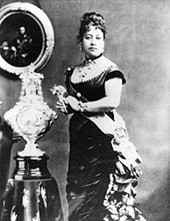
Queen Emma of Hawai’i was born to her biological parents, George Nae’a and Pane Kama’iku’I Young in 1836. Her place of birth has been debated with archaeological evidence suggesting she was born at a house in Kawaihae belonging to her mother.
However, her adoption papers and her obituary in the Hawaiian Gazette and the Daily Bulletin reported that she was born in Honolulu.
Emma married Alexander Liholiho, Kamehameha IV, in 1856. They ruled together for seven years and were at the helm of the religious reforms. The couple had one child, Prince Albert Edward Kauikeaouli Kaleiopapa, who was heir apparent until his sudden death at four years old.
The couple built the first public hospital on the island, with Emma being instrumental in raising the funds for the hospital. The hospital was also named after the queen, with The Pacific Commercial Advertiser
and the Ka Nupepa Ku’oko’a newspapers crediting Emma with having the idea for the hospital in the first place.
Kamehameha IV died in November 1863 after experiencing bouts of illness throughout the year. Emma was reportedly heartbroken after the death of her husband.
Letters exchanged between Emma and Queen Victoria show how the queens found solace in each other as widows, with Victoria having lost her own beloved husband Prince Albert two years earlier. was valued.
Her widowhood was not dour, however. In 1865, Emma travelled to England, she stopped at Acapulco and Panama City on the way, and in 1866 she travelled to America before returning to Hawai’i.
She was placed in the royal spotlight again in 1874 after King Lunalilo died without naming his successor, although it was rumoured that he was going to pick Emma. With no successor named, the next king must be elected.
Queen Emma and David Kalakaua both put themselves forward and whilst Emma had much support for her campaign, Kalakaua was ultimately successful.
Emma died in 1885 of a suspected stroke and was buried with a full state funeral and interred at the Royal Mausoleum of Hawai’i alongside her husband and son.
Recommended Reading
Alfons L. Korn and Mary Kawena Pukui, “News from Molokai: The Letters of Peter Young Kaeo (Kekuaokalani) to Queen Emma, 1873-1876,” Pacific Historical Review 32 (1963): 7-34
David W. Forbes, ed., In Haste with Aloha: Letters and Diaries of Queen Emma 1881-1885 (O’ahu: University of Hawaii Press, 2017)
George S. Kanahele, Emma: Hawaii’s Remarkable Queen (O’ahu: University of Hawai’i Press, 1999)
Julie Kaomea, Charles Ahlo, and Jerry Walker, “Education for Elimination in Nineteenth-Century Hawai’i: Settler Colonialism and the Native Hawai’ian Chiefs’ Children’s Boarding School,” History of Education Quarterly 54 (2014): 123-144.
